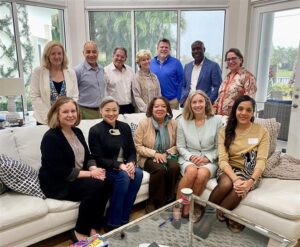Johns Hopkins UniversityEst. 1876
America’s First Research University
The Johns Hopkins School of Education (SOE) is in a moment of transformation, which includes the renovation of its beautiful historic home in Charles Village and the launch of its new strategic vision after two years of analysis and planning. The school’s National Advisory Council is playing a vital role in this time of growth — while undergoing a transformation of its own.

Mirroring the constantly evolving educational field it serves, the council took an editing pen to its format to make a few alterations to the status quo. Knowing this was a crucial moment to embrace the opportunity of change, council members worked with school leaders to create new structures that support meaningful engagement.
The changes involve varied structures to meetings, targeted and timely problem-solving, and flexibility for involvement. The school’s leadership was enthusiastically on board, and the council has now worked a full year with the revised formatting. Members meet more frequently: There were seven 90-minute meetings in the 2023-2024 academic year, compared to previously meeting only a few times a year in person. The meetings are completely virtual, except for one annual in-person retreat, which has allowed for representation from a wider geographic landscape.
Each meeting has a specific theme, and agendas include guiding questions that school leadership seek input on. This has helped the NAC members target advice to priority issues and spark productive dialogue around topics unique to SOE and its current aims. Topics over the past year largely centered on the school’s reinvigoration and strategic planning process. In the coming year, NAC members will tackle topics related to implementing the new strategic vision. For example, next spring the NAC will meet at the Hopkins Bloomberg Center in Washington, D.C., for an immersion in education policy and associated major challenges facing schools today, such as chronic absenteeism, teacher recruitment and retention, and school safety.
The new structure — a format that prioritizes dialogue over reporting — has strengthened the partnership between council members and SOE leadership, while also creating opportunity for shared advice between meetings. Robust discussions often highlight a member’s expertise, which allows the SOE and Dean Christopher Morphew to tap the member for insight and advice on specific issues as they come up. In addition, members have brought their entrepreneurial and managerial talents to bear by supporting the hiring process of several new leaders for the school.
Natasha Yamaoka, chair of the NAC, describes the impact of these changes: “The NAC members have been quick to answer the call to serve, think deeply, contribute to and support the evolution of both the SOE and of the NAC,” she says. “It has been so humbling to have the opportunity to work alongside a diverse group of advisors who are so passionate about education and Hopkins.”
The engaged council members include entrepreneurs, school system leaders, teachers, consultants, and marketing professionals among others. Some are SOE alumni, others are not. Collectively, they are concerned with global educational issues and how, through research and graduate education, the SOE can respond now and in the future to a field ever-evolving.
Topics: Alumni, Faculty and Staff, Foundations, School of Education, Strengthening Partnerships